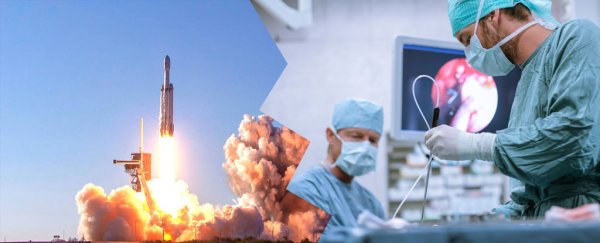Have you ever wondered why we single out brain surgeons and rocket scientists as the crème de la crème of the human intelligence pool?
Given we use the phrases 'It's not rocket science' and 'It's not brain surgery' interchangeably, who would win out in a battle of the ultimate wits?
In The BMJ's light-hearted Christmas Issue, a team of definitely unbiased neuroscientists tried to find out scientifically who deserves the crown.
"The phrase 'It's not rocket science' is thought to have originated in America in the 1950s when German rocket scientists were brought over to support the developing space program and design of military rockets," a research team led by University College London neuroscientist Inga Usher explain in their new paper.
"The origin of 'It's not brain surgery' is less clear. It is tempting to speculate that the pioneering techniques of the polymath and neurosurgeon Harvey Cushing captured the attention of the public and promulgated the phrase."
Regardless of the verbal origins, in their experiment the researchers analyzed the cognitive test scores of 329 aerospace engineers and 72 neurosurgeons, comparing participants' skills in problem solving, including planning and reasoning, working memory, attention, and emotion-processing abilities.
While the results suggested there are small differences between the two groups, no one came through clearly on top.
"The neurosurgeons showed significantly higher scores than the aerospace engineers in semantic problem solving," the researchers write, noting their ability to define rare words and understand verbal analogies.
Those results are perhaps due to neuroscientists' exposure to medical terminology derived from Greek and Latin, providing a linguistic advantage, the researchers speculate.
"Aerospace engineers showed significantly higher scores in mental manipulation and attention," the researchers explain, which suggests these skills, like the ability to mentally rotate a 3D object, can increase with training.
"No difference was found between groups in domain scores for memory, spatial problem-solving, problem-solving speed, and memory recall speed."
When the researchers then compared the rest of us chumps – 18,257 members of the general population – to brain surgeons and rocket scientists, they found only minor differences in cognitive prowess.
"When each group's scores for the six domains were compared with those in the general population, only two differences were significant: the neurosurgeons' problem-solving speed was quicker and their memory recall speed was slower."
In a nutshell, then, it seems like anyone has the potential to be a neuroscientist- or rocket-scientist-level genius, at least going off the results of this tongue-in-cheek experiment.
"In situations that do not require rapid problem solving, it might be more correct to use 'It's not brain surgery', but in situations where rapid information recall is needed this phrase should be avoided," the team concludes.
Of course, there are many ways to be smart, and there's no doubt that both neurosurgeons and aerospace engineers need to accumulate a huge amount of learned knowledge to be able to do their jobs properly.
Even so, maybe we're giving brain surgeons and rocket scientists a bit too much credit.
"It is possible that both neurosurgeons and aerospace engineers are unnecessarily put on a pedestal and 'It's a walk in the park' or another phrase unrelated to a career might be more appropriate," the researchers explain.
"It is also possible that other professions might deserve to be on that pedestal, and future work should aim to determine the most deserving group."
The research has been published in the yearly Christmas edition of The BMJ.
